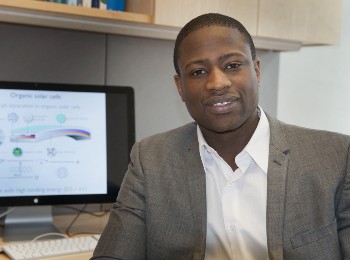Feb 13 2014
Originally from Paris, France, Ismaila Dabo has family roots in Guinea, a West African nation blessed with abundant sunshine to match the sunny optimism of its people. But despite these powerful sources of energy, there is a lack of electricity to power the country.
 Ismaila Dabo is an assistant professor of materials science and engineering at Penn State. Image: Patrick Mansell
Ismaila Dabo is an assistant professor of materials science and engineering at Penn State. Image: Patrick Mansell
"People there do not have the basic items that many of us take for granted here," says Dabo, an assistant professor of materials science and engineering. "Many students, for example, can't study at home at night. You will see them studying at the airport, one of the few places equipped with electric lights."
Creating and storing energy from the sun and other sustainable sources could dramatically change the lives of people in Guinea and around the globe, says Dabo. He hopes his research may play a role in the discovery of materials that can economically and efficiently create solar panels, batteries, capacitors and fuel cells.
Dabo, a computational materials scientist, creates simulations of everything from electrochemical environments to solar systems, exploring a realm governed by the fuzzy probabilistic rules of quantum mechanics. As scientists and engineers explore the world of the very small and as computers become faster and more powerful, materials researchers are increasingly relying on computer engineers to help them efficiently design new materials.
Before the computer era, materials scientists relied on hunches and guesswork when they devised new types of materials, says Dabo, who received bachelor's and master's degrees from Ecole Polytechnique in France before earning his doctorate from MIT.
He traces his career in computer simulation to an entrepreneurial streak and a few hobbies. As a student, he programmed soccer video games and sold them to his friends. Both soccer and computer games, he says, share elements in common with quantum mechanics. Successful game programming requires a thorough understanding of probabilities, just as quantum mechanics does. Game developers also must take into account physics -- the precise bounce of a soccer ball across a field, for instance. That, Dabo says, is not unlike a materials scientist's interest in how a particle might behave in the uncertain playing field of quantum mechanics.
"I actually credit this early interest in video games and game development for helping me develop the intuition for programming," he says.
Creating simulations at the quantum level and making predictions on how new materials will behave requires immense computing power, only recently available. "It is really fantastic to see how much we can learn from these simulations," Dabo explains.
Simulations can give researchers a chance to model changes in a material and test its performance without expensive rounds of experimentation. Accurate simulations also shave off considerable time in research and development, he adds.
"There is a lot of time between development of materials and deployment -- usually about 20 years," Dabo says. "By combining computations and experiments, it is hoped that this development time could be decreased by anywhere from five to seven years." Faster development of materials and metamaterials will in turn improve the speed and performance of future computers, he says.
Power is crucial. Materials that don't heat up so much can pave the way for more powerful computers and better batteries can allow people to use their phones and laptops for longer periods without recharging.
"The big picture is that most of the new technologies need power," Dabo says. "We need batteries to power laptops, and smart phones, and tablets."
But better computers are only one improvement he hopes his efforts will yield. Dabo came to Penn State in 2013 to continue research that one day may allow him to see the students in Guinea -- and around the world -- using those super-fast laptops in well-lit study spaces.
Hydrogen fuel cells, which convert hydrogen fuel into sustainable electricity, are another area of exploration. The material that makes up fuel cells must be particularly pure, Dabo says. Impurities -- often called chemical poisons -- can harm the cell, making it less efficient and long-lasting.
Materials improvements may also lead to better capacitors and batteries and pave the way for electric cars and hybrid vehicles that can travel farther on a single charge and recharge much faster once they do run low on power.
"Many new technologies will need to be developed to meet these needs," Dabo says. "It will take engineers and scientists -- and new materials -- to create and improve them."